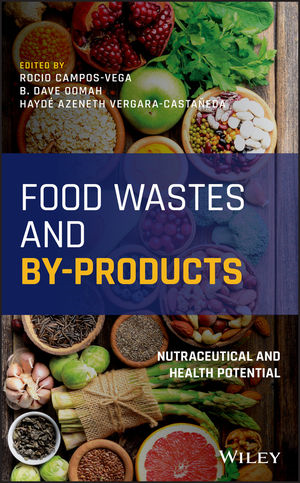Food Wastes and By Products Nutraceutical and Health Potential
Material type: TextLanguage: English Publication details: Hoboken, NJ : Wiley Blackwell, c2020Edition: 1stDescription: XVIII, 458 p. : illISBN:
TextLanguage: English Publication details: Hoboken, NJ : Wiley Blackwell, c2020Edition: 1stDescription: XVIII, 458 p. : illISBN: - 9781119534105
- 664 CAM
| Item type | Current library | Shelving location | Call number | Copy number | Status | Date due | Barcode |
|---|---|---|---|---|---|---|---|
 Reference Collection
Reference Collection
|
Reference Section | Reference Section | 664 CAM | Available | 97846 | ||
 Reference Collection
Reference Collection
|
Seminar Library | Department of Food Engineering | 664 CAM | 2022-23 | Available | 98237 |
About the Author
DR. ROCIO CAMPOS-VEGA is Researcher-Professor, Universidad Autónoma de Querétaro, Santiago de Querétaro, Mexico, and is part of Mexico's National Research System.
DR. B. DAVE OOMAH is a retired research scientist formerly responsible for crop utilization in the National Bioproducts and Bioprocessing Program at Agriculture and Agri-Food Canada.
DR. HAYDÉ AZENETH VERGARA-CASTAÑEDA is Researcher-Professor, Universidad Autónoma de Querétaro, Santiago de Querétaro, Mexico, and is part of Mexico's National Research System.
Summary:
A complete guide to the evolving methods by which we may recover by-products and significantly reduce food waste
Across the globe, one third of cereals and almost half of all fruits and vegetables go to waste. The cost of such waste – both to economies and to the environment – is a serious and increasing concern within the food industry. If we are to overcome this crisis and move towards a sustainable future, we must do everything possible to utilize innovative new methods of extracting and processing valuable by-products of all kinds.
Food Wastes and By-products represents a complete primer to this important and complex process. Edited and written by leading researchers, the text provides essential information on the supply of waste and its composition, identifies foods rich in valuable bioactive compounds, and explores revolutionary methods for creating by-products from fruit, vegetable, and seed waste. Other chapters discuss the nutraceutical properties of value-added by-products and their uses in the manufacturing of dietary fibers, food flavors, supplements, pectin, and more. This book:
Explains how reconstituted by-products can best be used to radically reduce food waste
Discusses the potential nutraceutical assets of recovered food waste
Covers a broad range of by-product sources, such as mangos, cacao, flaxseed, and spent coffee grounds
Describes novel extraction processes and the emerging use of nanotechnology
A significant contribution to the field, Food Wastes and By-products is a timely and essential resource for food industry professionals, government agencies and NGOs involved in nutrition, agriculture, and food production, and university instructors and students in related areas.
